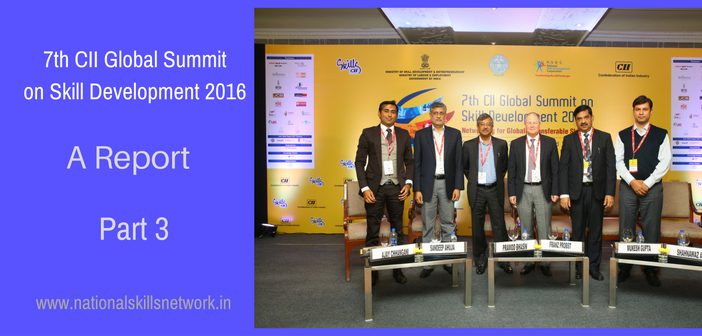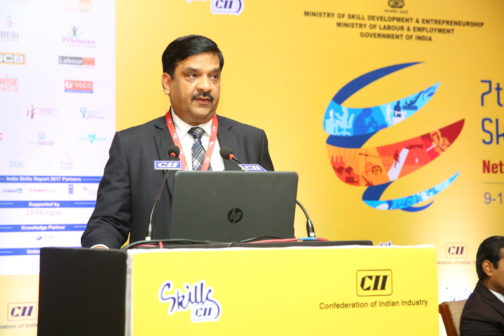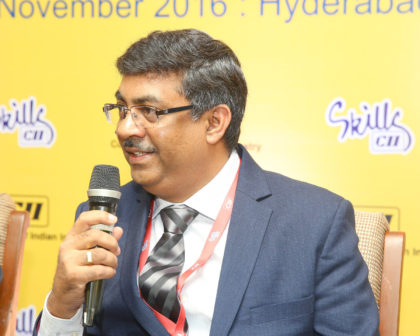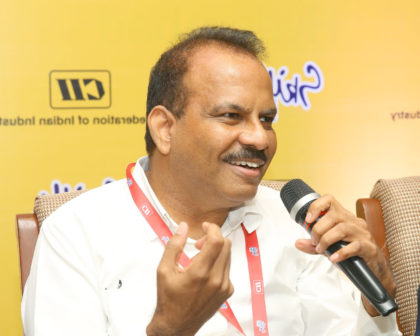This is the third part of the report on the 7th CII Global Summit on Skill Development 2016, held on 9th -10th November at Hyderabad.The report is presented in 4 parts. Click here to read Part 1, Part 2 and Part 4. In this part we present a summary of the proceedings from sessions on the second day of the event.
Special Session: Transforming the skill landscape – quality training, standards and scalability. The session was chaired by Mr. Pramod Bhasin.
Session highlights: Key points discussed in the session
- Long term vision for skill development with career paths and apprenticeship options
- Training of trainers to meet high volumes with quality and effectiveness
- Promotion of entrepreneurship along with skilling for job creation
- Making skills aspirational through the concept of living wages
- Explore new ways to appreciate, respect and support skilled workforce

Download the event report: Click here to download the complete report on the proceedings of the event in PDF format.
Mr. Franz Probst, Chairman and Founder, SkillSonics
Mr. Franz Probst talked about the Swiss vocational model and the 100 year old apprenticeship program that they want to share with India. In Switzerland, it is mandatory for a child to learn a vocation, but this is a key challenge that India is facing, the necessity to create a system viable for all stakeholders like job aspirants. According to Mr Probst, three major areas need immediate focus
- Create pathways for career opportunities
- Imbibe quality in all processes and systems that concern vocation
- Create excellent teachers and trainers through training
Mr. Mukesh Gupta, VP, Maruti Training Academy
 Mr. Mukesh Gupta explained how skilling and entrepreneurship go hand in hand and they have to create viable job opportunities. He highlighted some aspects of training at Maruti while he discussed about how:
Mr. Mukesh Gupta explained how skilling and entrepreneurship go hand in hand and they have to create viable job opportunities. He highlighted some aspects of training at Maruti while he discussed about how:
- In Maruti, for delivering one car they need 16 people working on 16 jobs and their aim is to make 2 million cars by 2020, and this shows how much manpower is needed.
- Maruti’s challenge is to have trained trainers on pan India basis and expand the skilling process into rural areas through effective communication.
Mr. Sandeep Ahuja, Director, VLCC Healthcare
Mr. Sandeep Ahuja explained how with 76 Beauty Service centers in 45 cities in India, they are a major industry partner for skill development. He also mentioned the steps being taken to recognize and respect vocational students, and observe the need to promote apprenticeships. Other insights from him include:
- Promotion of entrepreneurship since each of the center owners happens to be a former employee
- To overcome the huge dearth of trained workforce, the industry has to voluntarily get into the skill space and ensure better salaries after certification.
Mr. Shahanwaz Ali, Founder, Sevak, PanIIT Reach for Indian Foundation PARFI
Mr. Shahnawaz Ali, emphasized on the need for a self-sustained model for training blue collared workers and the need to collaborate with policy makers at the top level. Elaborating on the need to implement the concept of living wage, he suggested that:
- Living wages become more aspirational for the candidate to enter the industry
- Real skill building happens only on the field
- We need to chase quality and productivity, and make sure the trainees get jobs and they in turn provide quality services to the skill sectors
Mr. Ajay Chhangani, CEO, Rise India
Mr. Ajay Chhangani exhorted the audience to appreciate and respect skilled workers. The talked about how the country is divided into two: India and Bharat (rural India) and skills could bridge the gap between them as his organization works with both and helps people in earning sustained livelihood. He laid emphasis on points like:
- Skill development has to become people’s movement, only when it reaches into the lives of people, and channelize the energy and power we have in economic development.
- Need to support and appreciate the skilled people around us and we need to pledge to take skill India forward.
Session 2: Skilling India for Make in India – how both are interdependent and how Indian can take advantage of technical workforce with numbers and quality. The was session moderated by Anil Mathur, Chairman, Furniture and Fittings Skill Council, COO, Godrej Interio.
Session highlights: Key points discussed in the session
- NSDC’s efforts at driving and ensuring quality in skill development project
- Map skilling courses with the industry demands and job role
- Show the growth path to technically skilled workers through leadership role
- Embrace digital technologies and create awareness about skilling at the grassroots level
- Impart sector specific training and improve wages to enhance the value of skilled workforce
Mr. Manish Kumar, CEO, NSDC
 Mr. Manish Kumar, IAS, presented the high level overview of various aspects related to ensuring quality in skill development while striving to meet the target, from the perspective of MSDE and NSDC. He quoted an inspiring example from Mr. Rajiv Pratap Rudy, Minister for Skill Development and Entrepreneurship (MSDE) by saying that we cannot repair an airplane up in the sky. Since, Mr Rudy is a pilot himself, this point provides the essence and criticality of skilling at the right time. Following are other highlights from Mr. Kumar’s presentation:
Mr. Manish Kumar, IAS, presented the high level overview of various aspects related to ensuring quality in skill development while striving to meet the target, from the perspective of MSDE and NSDC. He quoted an inspiring example from Mr. Rajiv Pratap Rudy, Minister for Skill Development and Entrepreneurship (MSDE) by saying that we cannot repair an airplane up in the sky. Since, Mr Rudy is a pilot himself, this point provides the essence and criticality of skilling at the right time. Following are other highlights from Mr. Kumar’s presentation:
- Make in India is possible only when we have makers for India and for this skills are very important; the challenge is to ensure quality
- There’s been quite a bit of learning on the feet as MSDE a new ministry.
- The biggest difficulty for firms is the quality of manpower and getting the right kind of people, there is a long-term training and short term training combination.
- NSDC is making effort to ensure quality through NSQF and conformance to international standards and PMKVY 2 has more rigorous quality parameters and norms to follow
- Every training should be of good quality, adhering to the NSQF and should be properly planned right from the grass root level.
- There an emerging synergy between DIPP and MSDE as there are 25 SSCs deeply involved in ensuring good quality NOS and QPs
Mr. Jawaid Ashraf, EVP, HR, JCB
With a background in construction industry, Mr.Jawaid Ashraf presented a 3-way perspective to look at skills: where do we the right people, how do we train them and how do we increase the workforce to meet the demand. Other points from his talk included:
- Being the largest construction manufacturing company of India, JCB employs around 5000 people and builds machines with global quality and exports to 60 countries.
- There is a mismatch between the courses that are being offered and the need for the skills required in the market. This widening gap has to be addressed.
Ms. Bhavana Jaggi, Schneider Electric India Pvt Ltd
Elaborating on the Schneider program, Ms.Bhavana Jaggi said, on the shop floor, they have explored getting more women and girls from rural areas and educating them on the importance of health, hygiene, sanitation, nutrition and discipline. She also suggested that there’s a need to:
- Tie up with educational, leadership training providers for operators and engineers, pull them into executive roles for tapping the potential
- Work hand-in-hand with the government where there is plenty of room for everyone and there is gain from one another.
Mr. Dasari Rama Krishna, Chairman, Sub-committee, CII, SR and MD, Efftronics Systems Pvt Ltd
 Mr. Dasari Rama Krishna presented his thoughts on the need to embrace digital technologies in skill development and prepare the workforce for industry 4.0. To mention some key messages from his talk:
Mr. Dasari Rama Krishna presented his thoughts on the need to embrace digital technologies in skill development and prepare the workforce for industry 4.0. To mention some key messages from his talk:
- Today each chip is a system, roles in electronics together with digital technology and industry 4.0
- Biggest challenge and how to create value through the system, create awareness among students
- There is a need to create internships, encourage industry to take interns, train the trainers, modernize the curriculum
- The aspirational aspects of skilling should be promoted positively since at grassroots level since people only know top 10 IT companies and not about manufacturing industry
Mr. Suri Penobolu Director, Solon
Mr. Suri Penobolu began his presentation describing the potential for employment in solar energy industry. The solar energy industry generates 2 million jobs and there’s severe dearth of talent. The need 3 million people at every NSQF level from 1 to 10. He also put forward points like:
- The need for on-the-job training for sector specific roles in SMEs
- Urgency to bridge the skill gap through short courses and there is no need for long courses to make people efficient on the job
- An example about how mundane cleaning of a solar panel can be a skillful job when done fast efficiently with right tools and monitoring
- Need to remove the Gordian knot as the non-IT jobs don’t compensate well and automation jobs need reskilling













Comments 2